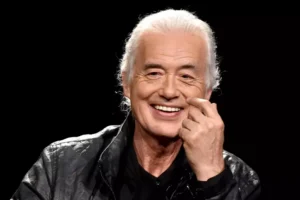
Robert Plant Reveals Why Led Zeppelin Disbanded
In a career that redefined rock music, the sudden death of drummer John Bonham in 1980 led to the heartbreaking end of Led Zeppelin. While there has been much speculation and numerous theories over the years, Robert Plant, the band’s legendary frontman, has been candid about why the iconic group ultimately decided to disband following Bonham’s passing.

For decades, Plant has been open about the profound emotional toll Bonham’s death had on him and his bandmates. In several interviews, including a landmark conversation in the early 2000s, Plant explained the gravity of the situation and the difficult decision the band had to make. The core reason, as Plant made clear, was that without Bonham, the band could never again recapture the magic that had made them one of the greatest rock acts in history.
A Family-Like Bond Shattered
To understand why the death of Bonham led to the band’s disbandment, it’s essential to grasp the deep, family-like bond between the members of Led Zeppelin. In Plant’s words, Bonham was not just the drummer of the band—he was its heartbeat. The band’s chemistry was deeply intertwined with Bonham’s drumming style, which was powerful, explosive, and completely unique. The group had built their sound on his rock-solid rhythms, and his influence permeated almost every aspect of their music.
Plant often described Bonham as not just a colleague but a true friend, and in many ways, he viewed the loss as the death of a brother. The bond between the members, particularly the friendship between Bonham and the rest of the band, was so vital that it was impossible to envision continuing without him. According to Plant, “John was more than just the drummer. He was the reason we played together so well. Losing him was like losing the soul of the band.”
The Turning Point: The Final Decision
On September 25, 1980, Bonham was found dead in his home after an alcohol-induced choking incident. His death was a devastating blow not just to the band, but also to their families and their millions of fans. The remaining members—Robert Plant, Jimmy Page, and John Paul Jones—gathered to discuss the future of the band.
Plant recalled the difficult conversations that followed Bonham’s death, explaining that the decision to end Led Zeppelin wasn’t immediate but became inevitable in the days that followed. “We tried to imagine continuing without John, but the reality was too much,” Plant said in various interviews. “We all agreed that Led Zeppelin without John Bonham was not Led Zeppelin at all.”
In the immediate aftermath of Bonham’s passing, the remaining band members were consumed by grief. They understood that Led Zeppelin’s music had been built around a particular sound that was inseparable from Bonham’s drumming. Page, the band’s guitarist and primary songwriter, was particularly torn between his desire to keep the band alive and his respect for Bonham’s irreplaceable role in the group.
The End of an Era
After discussions that lasted for several weeks, Plant, Page, and Jones came to the final, unanimous decision: Led Zeppelin would disband. It was clear that the magic and energy that had made the band so successful could not be replicated without their beloved drummer. “There was no way we could go on,” Plant later explained. “The loss of Bonham was just too much. It wasn’t about replacing him or finding someone else—it was about recognizing that Led Zeppelin had come to an end.”
The official announcement came in December 1980, and with it, the curtain fell on one of the most successful and influential bands in rock history. The decision, although inevitable, was not without its own internal struggles, particularly for Page, who had been deeply connected to the band’s music and its legacy. Plant, however, felt that continuing without Bonham would be disrespectful to both the band’s legacy and to Bonham himself.
A Legacy Without a Clear Future
In the years following Led Zeppelin’s disbandment, the individual members pursued their own careers. Plant went on to have a successful solo career, experimenting with a variety of musical genres and influences. Page, meanwhile, formed The Firm and took on various musical projects, but the shadow of Led Zeppelin loomed large over everything he did. Despite occasional talks of a reunion, both Plant and Page have repeatedly stated that it would be impossible to continue the band without Bonham.
While Led Zeppelin’s story did not have a triumphant return after 1980, its influence has never faded. The band’s albums continue to sell in huge numbers, and their music remains an integral part of rock’s legacy. The decision to disband, though difficult, preserved the sanctity of their work and the memory of Bonham. As Robert Plant put it in a 1990s interview, “There’s a part of me that will always be with those guys. But I’m not going to desecrate it by doing something that doesn’t have the right spirit.”
In the end, the decision to end Led Zeppelin after Bonham’s death wasn’t just about losing a drummer—it was about losing a crucial piece of the band’s soul. And for Robert Plant, the emotional toll of that loss was too much to overcome, both personally and creatively.